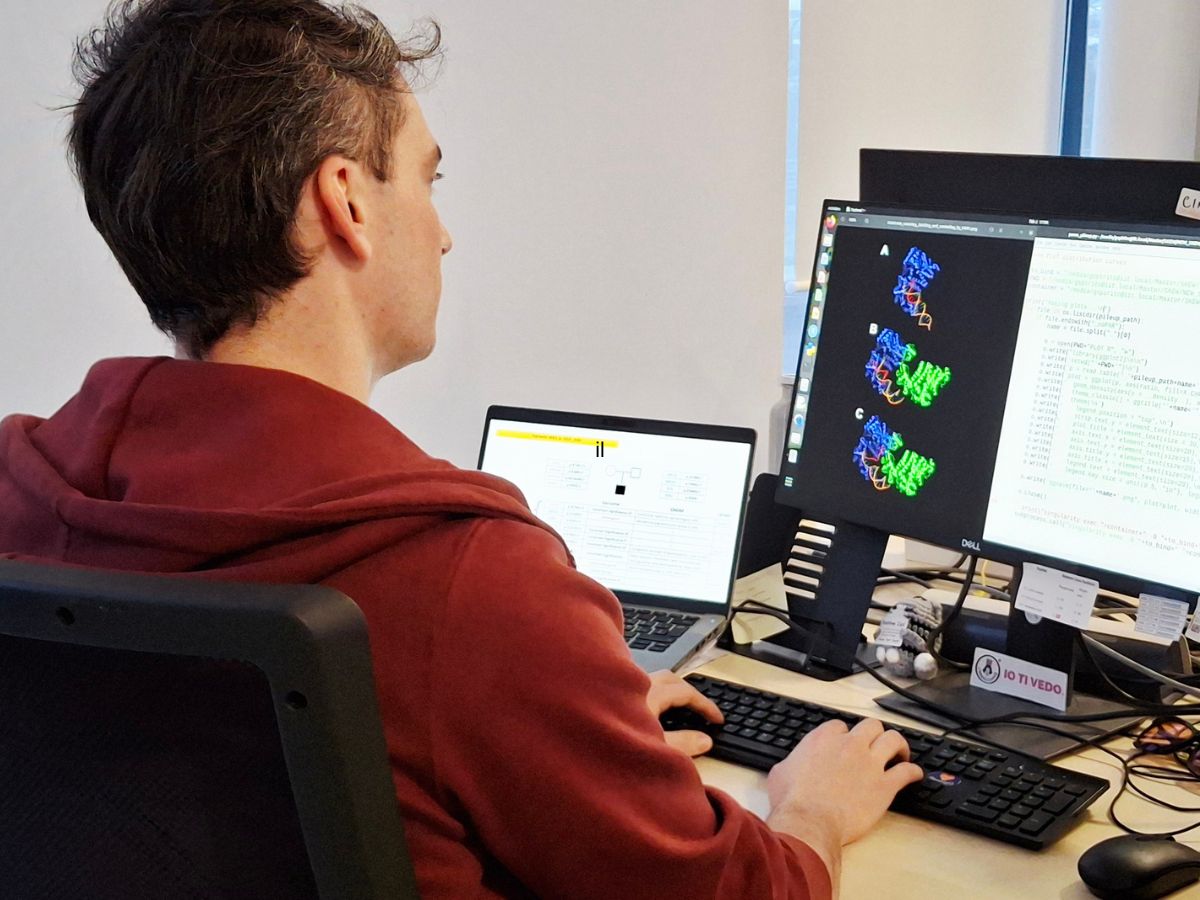Two teams from Istituto Italiano di Tecnologia (IIT-Italian Institute of Technology) competed in Cybathlon 2024 “Leg Prosthesis” category in Switzerland from 25 to 27 October 2024. Omnia, the new lower limb prosthetic prototype consisting of a bionic knee and ankle, secured first place marking its first public appearance; the motorless artificial foot SoftFoot Pro secured the second place and the “CYBATHLON LEG Jury Award”
Two lower limb prosthetic prototypes developed at the Istituto Italiano di Tecnologia (IIT – Italian Institute of Technology) took the podium at Cybathlon 2024, the international competition organized by the ETH-Eidgenössische Technische Hochschule Zurich at Swiss Arena in Kloten, Switzerland, from 25 to 27 October 2024. This event brings together research centers and companies from around the world to showcase technological innovations designed for individuals with motor disabilities. In first place on the “Leg Prosthesis” category podium was Omnia, from the joint Rehab Technologies IIT-INAIL lab, marking its first public appearance, while SoftFoot Pro, from IIT’s Soft Robotics for Human Cooperation and Rehabilitation Unit, claimed second place.
67 international teams competed at Cybathlon 2024 across 8 categories – based on the pilot’s disability and the technology in use – on racecourses designed to test the devices through a series of daily life activities. In the “Leg Prosthesis” category, 13 teams from Italy, India, Belgium, Chile, Poland, Taiwan, Switzerland, South Africa, Iceland, and the United Kingdom faced off. IIT participated with two teams, the Rehab Tech leg team and the Softfoot Pro team.
The Rehab Tech Leg team secured first place with the new Omnia technology prototype, developed by IIT in collaboration with the INAIL Prosthetics Center within the joint Rehab Technologies IIT-INAIL lab, coordinated by Matteo Laffranchi. While the SoftFoot Pro Team took second place and received the “CYBATHLON LEG Jury Award with the SoftFoot Pro artificial foot prototype, created by IIT’s Soft Robotics for Human Cooperation and Rehabilitation Unit, led by Antonio Bicchi, in collaboration with the Research Center E. Piaggio at the University of Pisa.
The Cybathlon marked the debut of Omnia, a novel lower limb prosthetic prototype designed for individuals with transfemoral amputations. This system comprises a knee (Unico) and an ankle (Armonico), both motorized. Omnia was the only device to reach the “Leg Prosthesis” final without using commercial components. Its pilot, Andrea Modica, successfully completed 9 out of 10 tasks, including navigating a balance beam while carrying buckets, ascending and descending stairs with objects, and traversing an inclined plane, in a remarkable time of 2 minutes and 57 seconds out of a maximum of 6 minutes.
The standout feature of the Omnia system is the communication between the two prosthetic components, Unico and Armonico, which exchange information from integrated sensors and adjust parameters for optimal performance across various tasks. The Unico knee combines hydraulic and electric technologies. The hydraulic system effectively aids in level walking or descending, ensuring quiet, smooth movement and energy efficiency. In contrast, the electric technology, supported by a patented system, provides active assistance during tasks such as climbing stairs, ascending steep slopes, or standing from a seated position. In the complete Omnia leg configuration, the transition between hydraulic and electric modes occurs automatically, thanks to the synergy of the two prostheses and advanced implemented algorithms.
The Unico prosthesis is equipped with a battery that lasts a full day under maximum usage and is suitable for both right and left knee prosthetics, supporting up to 125 kilograms. The device is customizable based on the user’s height and can be adjusted at the software level to match daily activity patterns, whether sedentary or active.
The Armonico ankle features an elastic foot coupled with an innovative screw mechanism, assisting the user during the initial foot strike by reducing heel impact for enhanced comfort and preventing tripping by lifting the toe during each step. Unlike passive foot prostheses, Armonico actively amplifies the ankle’s flexion angle, providing enhanced stability on sloped surfaces and ensuring a more natural movement. It is available in both right and left configurations and has a battery life of 24 hours.
“We are very pleased with this victory, the excellent teamwork, and the outstanding results we are achieving in our joint collaboration with INAIL on lower limb prosthetics,” says Matteo Laffranchi, Coordinator of Rehab Technologies IIT-INAIL at IIT in Genoa. “At Cybathlon, we were able to give a first demonstration of how the Omnia prosthesis—bionic at both the knee and ankle levels—enables high versatility and functionality, even in challenging environments. Special thanks go to all team members, especially Andrea Cherubini and Simone Traverso from the Rehab Technologies lab IIT-INAIL, who personally oversaw the development of this technology, bringing it to a high level of maturity and functionality, and to the pilot Andrea Modica. Their teamwork was exemplary”.
INAIL’s commitment to sports for individuals with disabilities is well recognized and serves as a tangible testament to how one can return to a full and active life even after a serious injury. While the Paralympics primarily showcase athletic performance, the Cybathlon was conceived to promote the development of new technologies, emphasizing the importance of synergy between these technologies and athletes to achieve high performance levels,” added Emanuele Gruppioni, Technical Director of the Research Area at the INAIL Prosthetics Center in Budrio, Italy. “The results achieved by the INAIL-IIT research team are a significant source of satisfaction, demonstrating how this synergy can drive the rapid development of advanced technology to serve people.”
The SoftFoot Pro, which debuted at the G7 Health technical event in Genoa on July 2024, was developed by IIT’s SoftBots research unit and features a unique design that can deform and adapt autonomously to various obstacles and surfaces. This innovation enhances gait naturalness and user stability, even on uneven terrains. Its pilot Flavio Gaggero also completed 9 out of 10 tasks in a time of 3 minutes and 46 seconds.
“We are proud to have secured the second place in the competition. Our innovative technology replicates the essential characteristics of the human foot, including the structure of the plantar fascia and energy storage capacity similar to the agonist-antagonist muscular system,” says Manuel Catalano, team leader of SoftFoot Pro. “This advancement significantly improves stability and energy efficiency, as demonstrated by our performance. We were one of the only two teams able to achieve the maximum score in the qualifiers, showcasing the natural capabilities of our technology. This great result stems from the extraordinary collaboration within our research team, and I would like to express my gratitude to Manuel Barbarossa, Anna Pace, Matteo Crotti, Giorgio Grioli, and Emanuele Sessa, along with the pilot Flavio Gaggero.”
The Cybathlon competition aims not only to highlight the performance of technological devices and the collaboration between pilots and their equipment but also to raise public awareness about the needs of individuals living with disabilities. It showcases the state-of-the-art technologies developed in this field and fosters collaboration among research centers.
IIT also participated in the “Arm Prosthesis” category with the Rehab Tech Arm team and the Hannes device, developed in the Rehab Technologies IIT-INAIL lab. It was worn by pilot Chiara Storchi, who placed seventh in the category.
The excellent placement of the two teams, especially considering the participation of companies already marketing their products, confirms IIT’s commitment to developing new health technologies based on real user needs.






